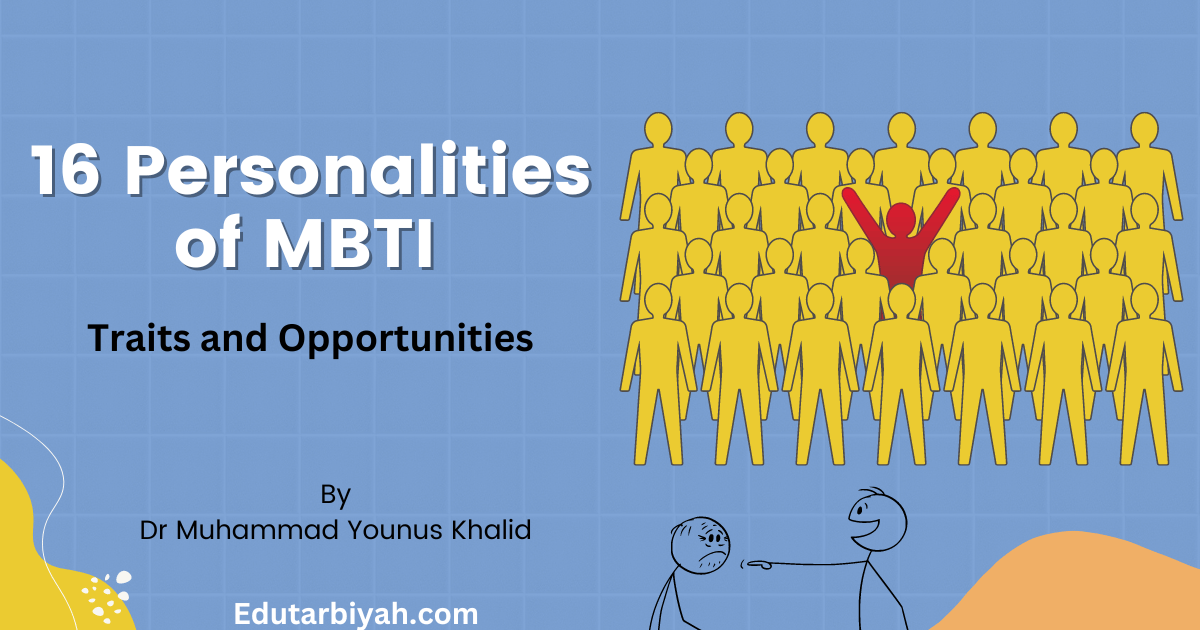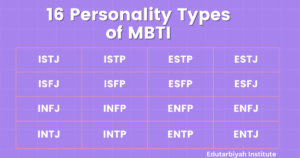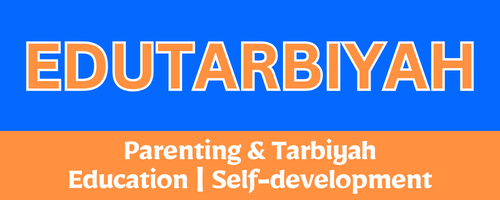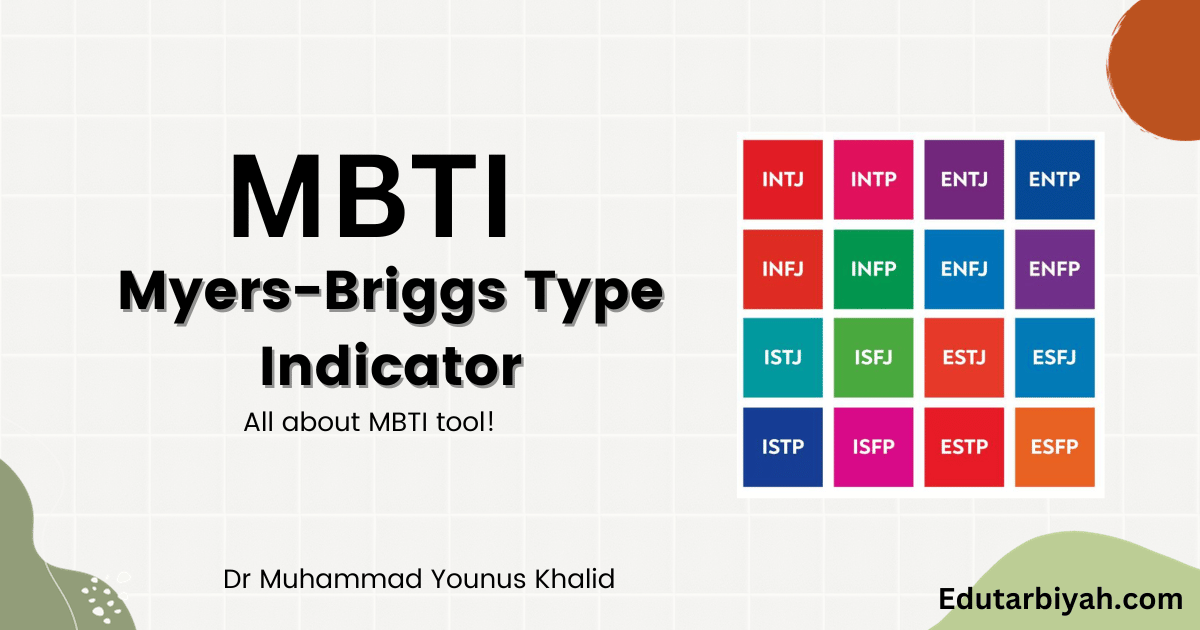16 Personalities of MBTI- Traits and Opportunities

The 16 personalities of MBTI, based on the Myers-Briggs Type Indicator, encompass various traits and offer insights into different preferences and tendencies. It classifies individuals into 16 distinct personality types based on four dichotomies:
-
Introversion (I) vs. Extraversion (E):
The 16 Personalities of MBTI framework is based on Carl Jung’s theory of psychological types. Introversion (I) and Extraversion (E) represent one of the key dimensions in this framework.
Introversion relates to individuals who tend to focus more on their inner world of thoughts, feelings, and ideas. They often recharge by spending time alone and prefer reflection over constant social interaction.
In contrast, Extraversion refers to individuals who draw energy from the external world of people, activities, and experiences.
They thrive on social interactions, are outgoing, and generally feel energized by being around others. The MBTI uses these preferences to understand how individuals engage with the world and make decisions.
-
Sensing (S) vs. Intuition (N):
Sensing (S) and Intuition (N) are dichotomies within the “16 Personalities of MBTI” framework that describe how individuals gather information and perceive the world. Sensing individuals (S) tend to focus on concrete details and information that is tangible and directly observable.
They rely on their five senses to gather data and prefer to deal with practical, real-world issues. On the other hand, Intuition individuals (N) are more inclined to perceive patterns, possibilities, and connections beyond what is immediately apparent.
They are interested in the abstract and enjoy exploring innovative ideas and potential outcomes. The MBTI uses these preferences to understand how individuals take in information and interpret their surroundings.
-
Thinking (T) vs. Feeling (F):
Thinking (T) and Feeling (F) are contrasting preferences within the “16 Personalities of MBTI” framework that relate to how individuals make decisions and evaluate information.
Thinking individuals (T) tend to prioritize logic, objectivity, and rationality when making decisions. They focus on analyzing situations impartially and prioritize consistency and fairness in their judgments.
Feeling individuals (F), on the other hand, prioritize empathy, emotions, and personal values when making decisions. They consider the impact on people involved, seek harmony, and base their decisions on what aligns with their deeply held values and the feelings of others.
The MBTI uses these preferences to understand how individuals process and evaluate information when making choices.
-
Judging (J) vs. Perceiving (P):
Judging (J) and Perceiving (P) are preferences within the “16 Personalities of MBTI” framework that describe how individuals approach the outside world and organize their lives.
Judging individuals (J) tend to prefer structure, organization, and decisiveness. They enjoy planning, having a clear schedule, and closure in making decisions. They are often goal-oriented and seek to establish control over their environment.
On the other hand, perceiving individuals (P) are more flexible, adaptable, and open-ended. They prefer spontaneity, enjoy exploring various options, and are comfortable with ambiguity.
They tend to keep their options open and may delay decisions to gather more information. The MBTI uses these preferences to understand how individuals approach tasks, organization, and decision-making in their daily lives.
Traits and potential opportunities for each of the 16 personalities of MBTI

Here are the detailed traits and potential opportunities for each of the 16 personalities of MBTI:
-
ISTJ (Introverted, Sensing, Thinking, Judging):
Traits:
Practical, responsible, detail-oriented, organized, and dependable.
Opportunities:
Accounting, administration, project management, law enforcement, logistics, or any role that requires precision and adherence to rules.
-
ISFJ (Introverted, Sensing, Feeling, Judging):
Traits:
Compassionate, loyal, supportive, meticulous, and empathetic.
Opportunities:
Nursing, administrative roles, teaching, counseling, social work, or any position that involves caring for others and offering practical support.
-
INFJ (Introverted, Intuitive, Feeling, Judging):
Traits:
Insightful, empathetic, creative, visionary, and determined.
Opportunities:
Counseling, writing, psychology, coaching, advocacy, non-profit work, or any field that allows for meaningful connections and making a difference.
-
INTJ (Introverted, Intuitive, Thinking, Judging):
Traits:
Strategic, independent, analytical, visionary, and goal-oriented.
Opportunities:
Leadership positions, entrepreneurship, research, technology, consulting, or any role requiring innovative problem-solving and strategic planning.
-
ISTP (Introverted, Sensing, Thinking, Perceiving):
Traits:
Adaptable, practical, analytical, hands-on, and resourceful.
Opportunities:
Engineering, mechanics, IT, programming, forensic science, or any field that involves problem-solving and working with tangible systems.
-
ISFP (Introverted, Sensing, Feeling, Perceiving):
Traits:
Artistic, sensitive, adaptable, empathetic, and spontaneous.
Opportunities:
Fine arts, graphic design, counseling, music, fashion, or any creative field that allows self-expression and helping others.
-
INFP (Introverted, Intuitive, Feeling, Perceiving):
Traits:
Idealistic, creative, empathetic, flexible, and passionate.
Opportunities:
Writing, counseling, teaching, social work, non-profit organizations, or any career aligned with personal values and a desire to create positive change.
-
INTP (Introverted, Intuitive, Thinking, Perceiving):
Traits:
Analytical, curious, independent, inventive, and logical.
Opportunities:
Scientific research, technology, academia, computer programming, engineering, or any field that involves problem-solving and intellectual exploration.
-
ESTP (Extraverted, Sensing, Thinking, Perceiving):
Traits:
Energetic, adaptable, resourceful, action-oriented, and sociable.
Opportunities:
Sales, entrepreneurship, sports, entertainment, emergency services, or any fast-paced career requiring quick decision-making and versatility.
-
ESFP (Extraverted, Sensing, Feeling, Perceiving):
Traits:
Enthusiastic, sociable, spontaneous, empathetic, and expressive.
Opportunities:
Performing arts, hospitality, event planning, sales, marketing, or any people-oriented role that allows for creativity and social interaction.
-
ENFP (Extraverted, Intuitive, Feeling, Perceiving):
Traits:
Innovative, charismatic, curious, empathetic, and adaptable.
Opportunities:
Entrepreneurship, coaching, creative fields, marketing, education, or any role that involves inspiring others and generating ideas.
-
ENTP (Extraverted, Intuitive, Thinking, Perceiving):
Traits:
Resourceful, witty, visionary, analytical, and versatile.
Opportunities:
Innovation management, consulting, entrepreneurship, research, technology, or any field where adaptability and strategic thinking are valued.
-
ESTJ (Extraverted, Sensing, Thinking, Judging):
Traits:
Efficient, organized, practical, responsible, and decisive.
Opportunities:
Management, law enforcement, military, finance, administration, or any leadership role requiring structure and efficiency.
-
ESFJ (Extraverted, Sensing, Feeling, Judging):
Traits:
Supportive, social, conscientious, nurturing, and cooperative.
Opportunities:
Teaching, healthcare, counseling, human resources, event planning, or any role focused on supporting and connecting with others.
-
ENFJ (Extraverted, Intuitive, Feeling, Judging):
Traits:
Charismatic, empathetic, inspirational, diplomatic, and visionary.
Opportunities:
Leadership, coaching, counseling, social activism, HR, or any career involving motivating others and creating positive change.
-
ENTJ (Extraverted, Intuitive, Thinking, Judging):
Traits:
Decisive, strategic, confident, assertive, and goal-oriented.
Opportunities:
Executive leadership, business management, entrepreneurship, politics, or any role requiring strong leadership and strategic planning skills.
Conclusion:
The “16 Personalities of MBTI” framework offers a profound insight into various personality traits, presenting a spectrum of opportunities for personal growth and understanding. By recognizing and embracing the unique combinations of Introversion (I) versus Extraversion (E), Sensing (S) versus Intuition (N), Thinking (T) versus Feeling (F), and Judging (J) versus Perceiving (P), individuals can explore their inherent strengths and areas for development.
This framework highlights that each personality type carries its distinct set of characteristics, presenting diverse opportunities for self-awareness, effective communication, and interpersonal relationships. Understanding these traits can pave the way for improved teamwork, conflict resolution, and personal development strategies.
By acknowledging these traits within ourselves and others, we gain a deeper appreciation for the richness of human diversity. Moreover, this awareness fosters an environment of empathy, acceptance, and collaboration, allowing individuals to harness their strengths and seize opportunities for personal and professional growth within their unique personality framework.
The “16 Personalities of MBTI” thus serves as a valuable tool for self-discovery, enhancing interpersonal dynamics, and embracing the myriad opportunities that come with understanding the intricacies of human personality traits.



